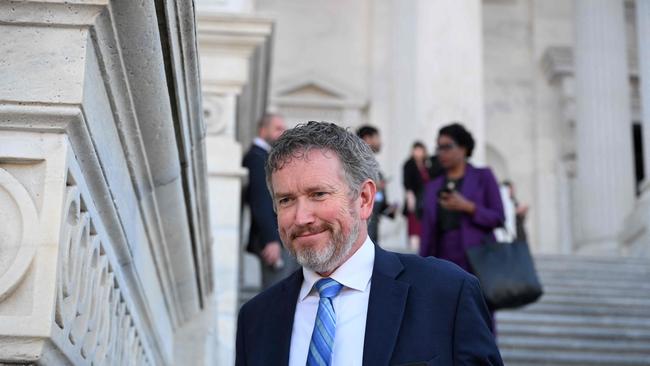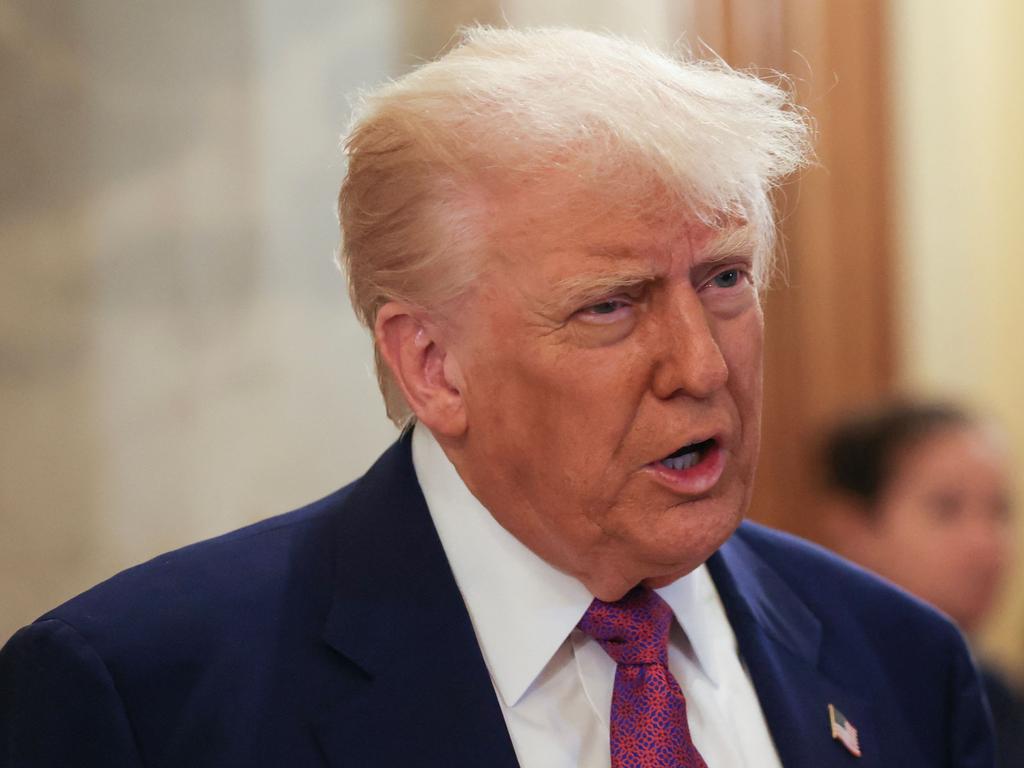House passes Trump tax bill after last-minute changes
The Republican-led House passed Donald Trump’s sprawling tax-and-spending bill early Thursday, after party leaders made a series of last-minute changes that united their warring wings.

The Republican-led House passed President Trump’s sprawling tax-and-spending bill early Thursday, after party leaders made a series of last-minute changes that united their warring wings.
The vote was 215 to 214, with one lawmaker voting present. The measure now goes to the Senate, where a similar tug of war could play out.
The passage of Trump’s “one big, beautiful bill” marked a major win for Trump and for House Speaker Mike Johnson (R., La.), who again found the formula that steered a course between hardliners who wanted deeper spending cuts and moderates worried that the bill would hurt their districts’ hospitals and clean-energy projects.
Reps. Warren Davidson of Ohio and Thomas Massie of Kentucky were the only two Republicans to vote against the measure, arguing it didn’t do enough to rein in deficit spending. Rep. Andy Harris (R., Md.) voted present. All Democrats opposed the bill.
The vote marks a significant step toward extending Trump’s expiring 2017 tax cuts and cementing other conservative priorities while trimming spending on Medicaid and food aid. It again showed the president’s power to unite fractious House Republicans, whose narrow majority meant that any handful of dissidents could have sunk the bill.
“This bill is our opportunity to deliver on the promises we made,” said Rep. Nathaniel Moran (R., Texas). “At its core, the one big, beautiful bill is about more than dollars and cents. It’s about liberty and empowering the American people.”
The vote came after an all-night session on the House floor and happened just hours after leaders released changes to the legislation designed to get final holdouts on board. The revised language to assuage conservatives would accelerate new Medicaid work requirements to December 2026 from 2029 and end certain tax credits for wind and solar energy by 2028 instead of a slower phase-out through 2031.
The updates would also formally lock in a $40,000 cap on the state and local tax deduction starting this year, up from a $30,000 cap in the prior plan. That change was designed to satisfy Republicans from high-tax states such as New York and New Jersey.

Lawmakers from states such as Florida and Texas that haven’t expanded Medicaid under Obamacare would get a favourable change to a funding formula, and border states would get $12 billion for security costs incurred during the Biden administration. An indoor-tanning excise tax that was eliminated in the original bill text would be maintained and a nuclear-energy tax break would be expanded. Federal land swaps in Nevada and Utah would be eliminated. Gun-rights supporters won changes to the tax treatment of suppressors.
Johnson spent Wednesday negotiating what leaders hoped were the final details to unlock the magic combination of votes. He shuttled to the White House with hardliners from the House Freedom Caucus who demanded faster, larger spending cuts and energy tax credit phase-outs and then huddled with moderates.
Johnson had vowed to finish the bill in the House before Memorial Day. It next goes to the Senate, where Republicans have a 53-47 majority, and changes are likely. Republicans are using a process known as budget reconciliation. That lets them bypass the Senate’s 60-vote filibuster threshold but comes with the restriction that the bill must be focused on fiscal matters.
Republicans are aiming to get the bill to Trump’s desk by July 4. The real deadline might be a bit later. The bill includes an increase in the debt limit, a step that Congress must take by August when the US could run out of cash and borrowing capacity to pay all its bills.
Democrats criticised the bill as taking money from the social safety net to fund tax cuts for the wealthy.
“It’s really one big broken promise,” said Rep. Suzan DelBene (D., Wash.). “Republicans have spent months fighting over how many Americans they’re going to kick off Medicaid and how fast.”
Extending old tax breaks, adding new ones
Broadly, the legislation combines a mishmash of Republican priorities into a single measure that carries the Trump agenda. It would extend expiring tax cuts for all income groups and create new tax cuts on top of that, such as a larger standard deduction, a larger child tax credit and versions of Trump’s campaign-trail promises to eliminate taxes on tips, overtime pay and Social Security benefits.
The bill would provide new money for border security, national defence and support for farmers. To cover some — but not all — of those costs, the bill would reduce spending on Medicaid and nutrition assistance. Those changes include new and tighter work requirements, more frequent eligibility checks and shifts that would push more costs to states.
“None of this is easy because we’re in a narrow majority, but it’s critically important that we deliver” policies to boost investment and wages, said House Majority Leader Steve Scalise (R., La.).
Before the final changes late Wednesday, the bill was expected to increase budget deficits by about $2.7 trillion over a decade, compared with a scenario where Congress does nothing. That’s a figure that was causing discomfort for some Republicans as the national debt and bond yields climb, and lawmakers didn’t have final budgetary estimates when they voted. Republican leaders say that faster economic growth from Trump’s policies would fill the gap and make it deficit-neutral, a point that many economists dispute.
Conservatives warned that the initial bill front-loaded tax cuts with 2028 expiration dates and delayed spending cuts, creating pressure for future Congresses to extend Trump’s proposals and further postpone pieces of the measure that reduce deficits.
Democrats, meanwhile, highlighted the contrast between tax-cut extensions for high-income households and spending cuts that would lower health insurance coverage and remove benefits for low-income households. They pointed to a Congressional Budget Office analysis showing that the bill would reduce resources for the bottom 10 per cent of households by income while giving more resources to those in the top 10 per cent.
“You guys make Marie Antoinette look down to Earth,” said Rep. Jim McGovern (D., Mass.). “This is, like, crazy. I can’t believe that you’re doing this.”
Republicans said they were targeting waste and fraud in the safety-net programs.
Rep. Brett Guthrie (R., Ky.), the chairman of the committee handling Medicaid, emphasised that many of the people who would lose health coverage from the changes are unauthorised immigrants or able-bodied people who would be affected by the new work requirements.
Changes to SALT cap
The new cap on the state and local tax deduction would start in tax year 2025, providing an immediate boost to residents of high-tax states on the tax returns they will file in early 2026. The $40,000 cap would start phasing down to $10,000 once income reaches $500,000, and both numbers would increase by 1 per cent each year through 2033.
However, the updated bill also includes a new limitation on the state and local tax deduction. People in the top 37 per cent tax bracket would only get the deduction at a 32 per cent rate, so that a $10,000 state tax bill would reduce federal taxes by $3,200 instead of $3,700. And the bill also expands the alternative minimum tax by changing the inflation adjustment in a way that raises revenue.
In addition, the proposed tax on remittances abroad would be 3.5 per cent, not 5 per cent. And some taxes on multinational companies would be increased slightly.
The changes include a reward of sorts for states that like Florida didn’t expand Medicaid under the Affordable Care Act, allowing their hospitals to receive higher rates of certain payments. Those states would be allowed to go up to 110 per cent of Medicare rates for their “state-directed payments” to hospitals, while states that did expand would be capped at Medicare rates.
Medicaid provides healthcare coverage to more than 70 million lower-income and disabled people. Under the new work requirements that would be imposed by the bill, most childless adults without disabilities between the ages of 19 and 64 would have to provide documentation that they worked 80 hours a month to qualify for Medicaid.
The nonpartisan CBO estimates that at least 8.6 million people would lose coverage by 2034 under the changes proposed by Republicans.
Wall Street Journal




To join the conversation, please log in. Don't have an account? Register
Join the conversation, you are commenting as Logout